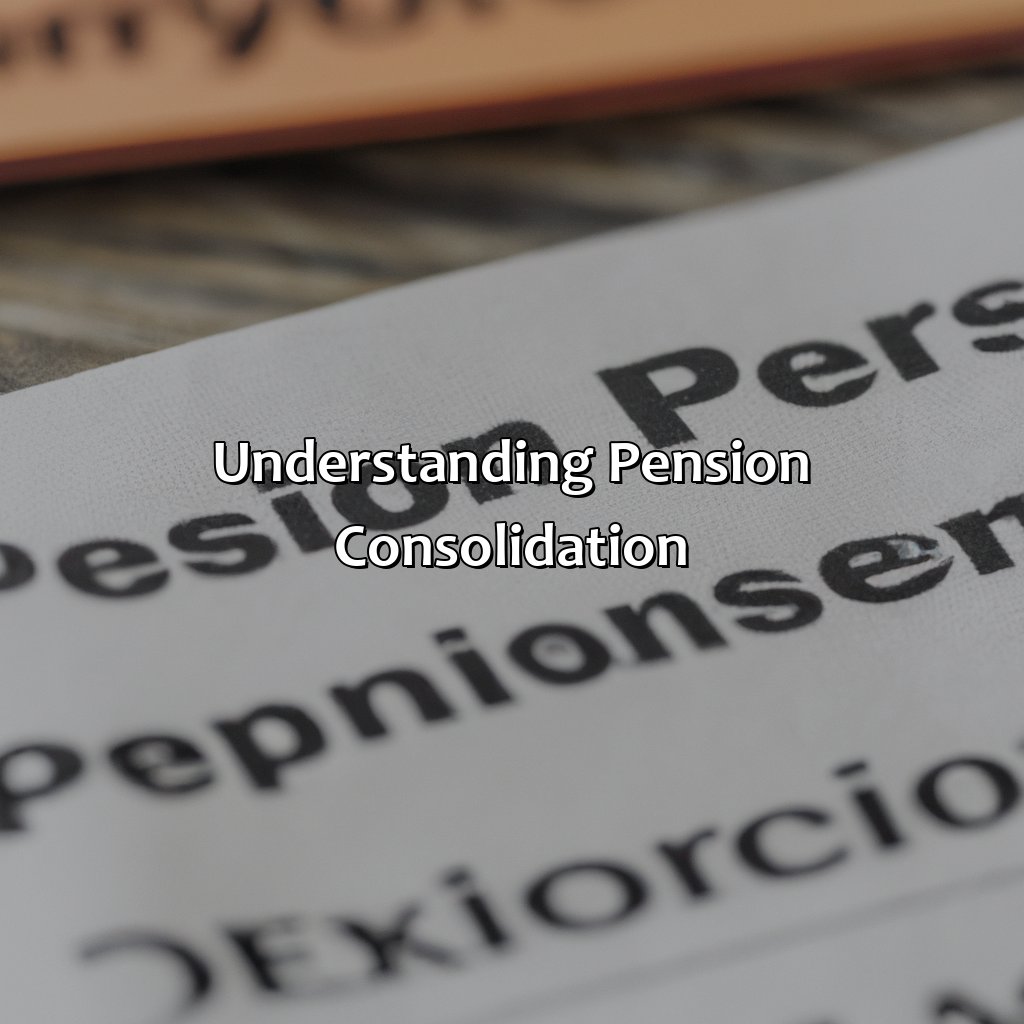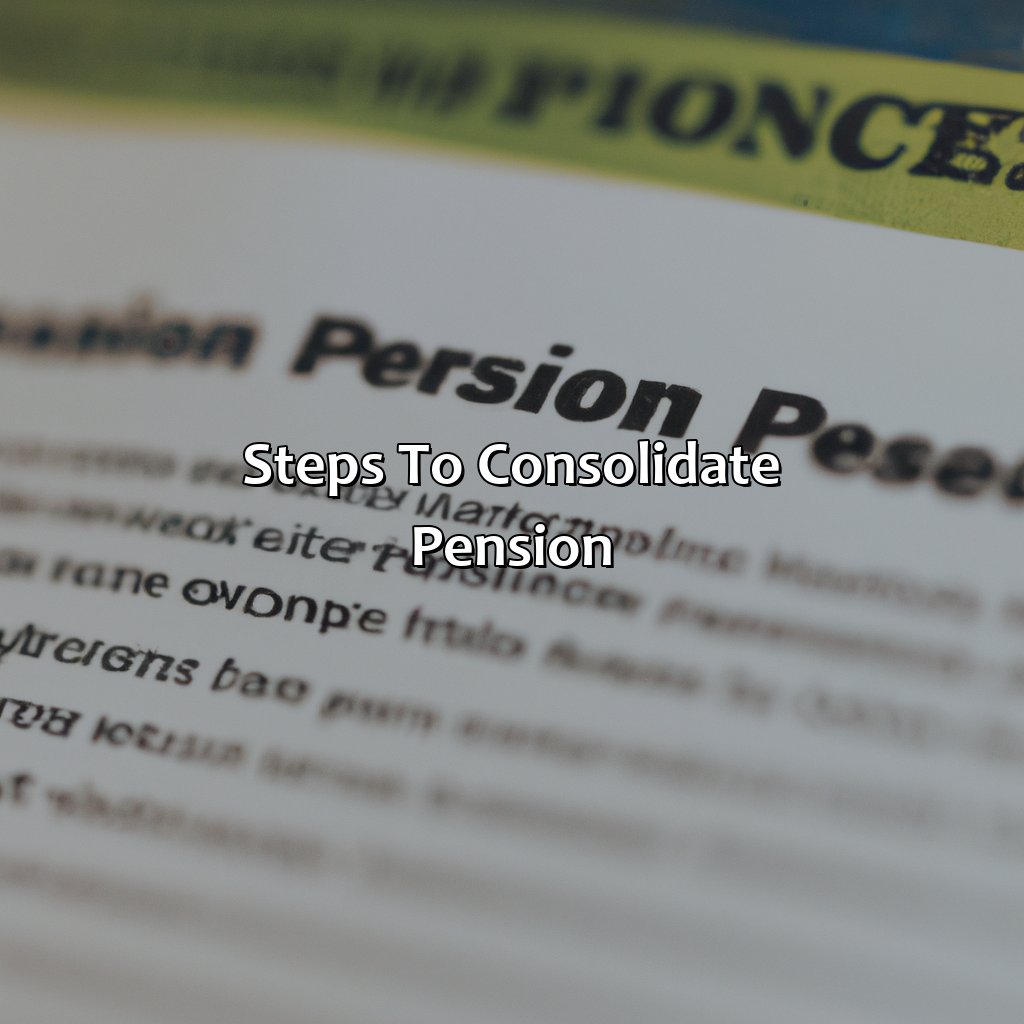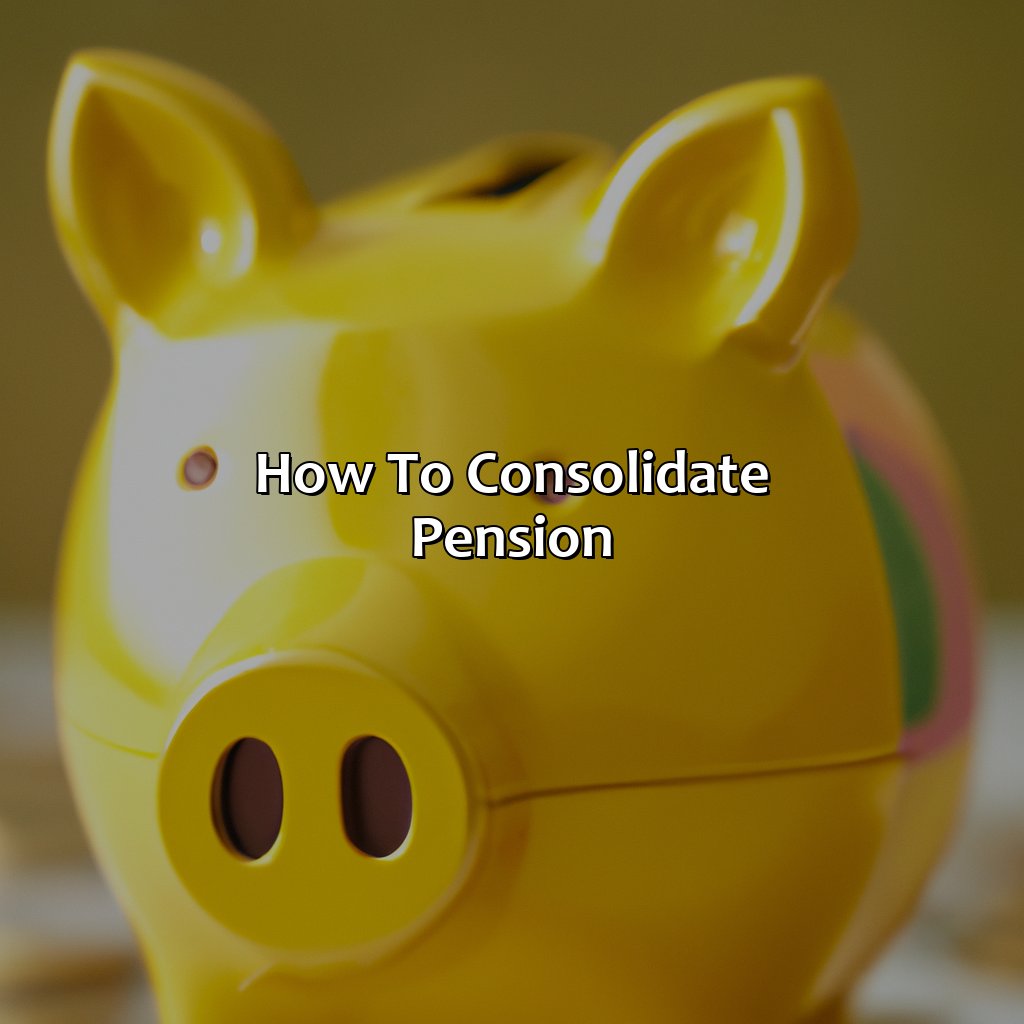How To Consolidate Pension?
Key Takeaway:
- Pension consolidation involves merging multiple pension plans into a single plan. This can simplify retirement planning and help individuals keep track of their savings more easily.
- Consolidating pensions can help individuals save money by reducing fees and charges from multiple pension plans. It can also potentially lead to higher returns on investment.
- When consolidating pensions, individuals should gather all relevant information on their pensions, compare options and fees for consolidation, and contact their pension providers to initiate the process.
Struggling to keep track of all your pensions? You’re not alone. Consolidating your pensions can be a powerful way to better manage your retirement savings and help you meet your long-term financial goals. Let’s explore the steps needed to make it happen.
Understanding Pension Consolidation
Want to understand Pension Consolidation? This section will give you a comprehensive understanding. It’s divided into two sub-sections:
- What is Pension Consolidation
- Benefits of Consolidating Pension
Pension Consolidation could be right for you if you wish to simplify your pension plans, save on fees, or manage investments better.

Image credits: retiregenz.com by Harry Jones
What is Pension Consolidation
Pension Consolidation refers to the process of merging multiple pension plans into a single plan. By consolidating, individuals can combine their pension plans to benefit from lower administrative fees and potentially higher returns. It’s an excellent option for those who have worked at different employers and have accumulated multiple pensions over the years.
Consolidating pensions also allows individuals to manage their retirement savings efficiently, with just one account to keep track of instead of several. It simplifies the process of monitoring your pension, making changes to allocations, and keeping beneficiary designations up to date. If you are interested in collecting pension early, consolidating your pensions can be a helpful step to take.
Suppose you own several pension schemes created through your employment with various companies or organizations throughout your career. In that case, consolidating them into one plan could make it easier to manage payouts in retirement while avoiding any potential risks associated with having multiple pension plans. Rolling over your pension to an Individual Retirement Account (IRA) is one option to consider when consolidating your pensions.
Pro Tip: Before consolidating your pension plans, be sure to compare fees and investment options across all accounts and make an informed decision based on your unique needs and circumstances. Learn more about how to value a pension to help you make the best decision.
Consolidating your pension is like Marie Kondo-ing your finances, except instead of sparking joy, you’re optimizing your retirement savings.
Benefits of Consolidating Pension
Consolidating your pension plan can offer significant benefits. Not only can it help streamline your finances, but it can also reduce fees and provide greater control over your investments. Additionally, consolidating your pension can simplify the management of your retirement savings and make it easier to track your progress toward your retirement goals.
- Reduced Fees: Consolidating pensions can lead to lower fees.
- Better Control: Consolidation provides you greater autonomy over investment choices.
- Simplification: You get a consolidated view of all accounts in one place.
- Increase Funds Quality: It gives access to high-quality funds.
- Fees Optimization: Reduction in annual fees containing similar holdings could help you save money.
- Elimination of Clutter: If you consolidate several pensions into one account, the paperwork decreases that rids headache.
Consolidating different pension plans allows you to merge funds, and eventually causes better performance overall where acting accordingly ensures streamlined financial management and a quicker path towards fiscal goals.
It has been reported by the AARP Public Policy Institute that nearly 25% of Americans ages 55-64 have not saved anything for retirement. If you are in the UK, and wondering how to claim old age pension, the process is quite simple. The consolidation process is the act of combining multiple retirement accounts to create a single, stronger account. It can be a wise financial move, as many people have multiple IRAs and 401(k)s lying around from previous employers.
Pension consolidation may sound daunting, but with these easy steps, you’ll be saying ‘goodbye’ to scattered retirement savings and ‘hello’ to a consolidated fortune!
Steps to Consolidate Pension
Consolidate your pensions with ease! Our expert guidance will help you with the simple steps. Here’s how:
- Gather information about your pensions first.
- Then, decide which approach is best.
- Lastly, contact your pension providers to consolidate.
Let’s dig deeper and understand the process more.

Image credits: retiregenz.com by Yuval Woodhock
Gather Information on Your Pensions
To start consolidating your pensions, it is essential to gain knowledge on all of your pension plans. Acquire an in-depth understanding through investigative research of what pensions you have and how much you’ve accumulated. This will enable better decision-making regarding pension consolidation.
Consider each pension plan’s specifics, such as fees, investment, fund performance, and retirement age. Compile this information into a comprehensive list or spreadsheet to gain a clear picture of the bigger financial picture.
Ensure that any pensions you do not recognize are investigated and verified through previous employment records. Furthermore, when gathering information on your pensions, ensure that each scheme accepts transfers from other schemes. If you’re wondering how to get a pension, these are important factors to consider.
Take action towards consolidating your pensions without delay. Concentrate initially on locating lost pensions instead of waiting until retirement age to consolidate them. A timely move could increase the final pension amount considerably while avoiding the risk of losing track of a missing plan. Learn more about when you can get your state pension and consolidate your pension today.
Choosing the right approach to consolidate your pension is like picking the perfect avocado – a delicate balance of timing and intuition.
Decide on the Best Approach
When it comes to consolidating pension plans, choosing the right approach is crucial. It’s important to evaluate your options carefully and decide which method aligns with your retirement goals. Some approaches include:
- Consolidating all pensions into one plan
- Transferring pensions to a new provider
- Leaving them where they are
Assessing the fees, investment performance and other factors can help in deciding on the best course of action.
Factors such as pension type, flexibility, personal circumstances, and contributions should be considered. In addition to this, one may also seek professional financial advice to facilitate the decision-making process. This will give clarity on how to apply for widows pension and whether to merge pensions or leave them as separate entities based on what option provides better benefits.
Benefits such as increased returns or reduced fees should not be missed out upon. Exploring various consolidation options will help you make better-informed decisions that will secure a happier retirement. It s essential to act now as delaying could reduce pension values over time and put savings at risk leading to regrets later in life. Learn how to buy a pension annuity to make the most out of your retirement funds.
Consolidating your pension providers is like Marie Kondo-ing your finances, but instead of decluttering your sock drawer, you’re decluttering your retirement savings.
Contact Pension Providers and Consolidate
When it comes to consolidating your pension, reaching out to Pension Providers is crucial. Consolidation can be accomplished smoothly by performing the necessary steps below.
- Begin by collecting all your pension information from multiple providers.
- Once you have all your paperwork in order, reach out to your pension providers to discuss consolidation options.
- Decide on the best option for your financial goals and ask any questions you may have before initiating the process.
- After getting recommendations from multiple sources, choose a regulated financial adviser to assist you in consolidating your pensions into a single plan.
It’s important to ensure that all of your needs and objectives are considered throughout the entire process. Being thorough will significantly reduce any possible risk of loss or potential penalties.
One important piece of advice is never transferring without considering penalties and fees that may apply along with other risks that may exist throughout the transfer process. If you’re wondering how to get your pension from your previous employer, it’s recommended to do thorough research and consider all the options available to you.
According to Forbes, some British savers’ over-zealous efforts have led them down pathways where they pay more fees than they saved by switching fund managers or merging plans too hastily. If you’re looking to opt out of pension, it’s important to carefully consider the potential drawbacks and seek professional advice before making any decisions.
Five Well-Known Facts About How To Consolidate Pension:
Consolidating pensions involves transferring multiple pensions into one scheme, making it easier to manage. (Source: Money Advice Service)
Consolidating pensions may lead to lower fees and charges, potentially saving money in the long term. (Source: Financial Times)
It’s important to consider the benefits and drawbacks of consolidating pensions, such as investment options and potential loss of benefits. (Source: Which?)
The first step to consolidating pensions is to gather information on all existing pensions, including current providers and any penalties for early withdrawal. (Source: PensionBee)
Professional financial advice may be beneficial when considering consolidating pensions, as it can help navigate the complex process and ensure it is the best option for an individual’s specific circumstances. (Source: Hargreaves Lansdown)
FAQs about How To Consolidate Pension?
What does ‘consolidate pension’ mean?
Consolidating pension refers to merging all your different pension plans into one. This means that instead of managing multiple pension plans separately, you have one account that contains all your pensions in one place.
Why should I consolidate my pension?
Consolidating your pension can make it easier to manage and monitor. You will have all your pension savings in one place, which can make it easier to keep track of how much you have saved. Additionally, consolidating your pension can make it easier to prepare for retirement, as you can have a better understanding of your total retirement savings.
How do I consolidate my pension?
You can consolidate your pension by first gathering information about all your pension plans. Once you have all the information you need, you can compare the fees, investment options, and other features of all your plans. Based on this comparison, you can choose the plan that offers you the best value for money and then transfer your pensions to that plan.
Are there any drawbacks to consolidating my pension?
One of the main drawbacks of consolidating your pension is that you may lose some benefits and protections, such as guaranteed annuity rates, that are specific to each plan. Additionally, if you have any benefits that are linked to a specific pension plan, you may lose these if you transfer your funds elsewhere.
Will I face any charges for consolidating my pension?
There may be fees and charges associated with consolidating your pension. Some pension plans charge exit fees for transferring funds out, while others may charge fees for managing your pension. It is important to carefully review the terms and conditions of each plan before you make a decision to consolidate your pension.
Do I need to take professional advice before consolidating my pension?
It is generally recommended to seek professional financial advice before consolidating your pension, as this can be a complex process and there may be some risks involved. A financial advisor can help you evaluate the benefits and drawbacks of each plan, as well as ensure that you are making an informed decision.
 Checkout this IRS Loophole
Checkout this IRS Loophole 
